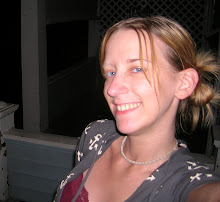I've been writing since I was just a little thing, when my second grade teacher told my mom I had a gift for storytelling. It was definitely that particular event that inspired me to be a writer--hey, I thought, at least I'm good at something. May as well run with it. However, writing remained a task mostly associated with school until I reached sixth or seventh grade, when I decided to write a novel.
Once I started, I couldn't stop. I had never been addicted to anything before--well, besides reading, of course--and writing that novel became my first fixation. I thought about it all day, throughout every class in school. My characters spouted off whole pages of dialogue while I learned about the cardiovascular system in health class. Entire scenes were transcribed on the blank pages of my mind while my math teacher talked about...well, who the hell knows. I hate math.
The hour-long bus ride home was pure torture every day. I couldn't wait to get home, kick off my shoes, and make a mad dash to the computer. I still maintain that I didn't write that book--it wrote me.
And so it was that I wanted to devote every waking second to it. I hogged the precious computer all evening, detaching myself from it with the greatest reluctance when bedtime came. Usually, I had to be told three or four times to get ready for bed, so enthralled was I with this world and these characters I'd created.
But those characters still wouldn't shut up, even while I lay in bed and waited for sleep. My usual routine went something like this:
- Go to bed.
- Read until everyone else has gone to bed--which could take a long time, since we were a family of six.
- Sneak upstairs (we had a ranch style house--my bedroom was on the lower level, and the computer was in the kitchen, at the top of the stairs).
- Power up the computer.
- Write until I couldn't hold my head up anymore.
Yes, dear readers, I worried about getting caught writing. It wasn't that my parents disapproved, or that they disliked it in any way--it was just that it was midnight, and I was twelve years old. As much as my mom encouraged me to write, she also encouraged me to sleep more than six hours each night.
So, I frequently wrote in the dark. I'm almost certain that I wrote the final chapters at night, while everyone else in the house slept. I have a clear memory of finishing that particular novel, and in that memory, it's pitch dark but for the white glow of the monitor, and I'm grateful for the solitude, because the ending was quite emotional.*
That book was far from perfect, or even logical--most of the deaths occurred from a bolt of lightning that set a house afire on a beautiful, blue-skied summer day--but it was mine, dammit. I'd worked slavishly on it, devoted myself to it, sacrificing sleep and playtime and maybe a little bit of learning.
The sad fate of that particular book is another topic for another day, but its effect is still felt. When I'm writing at the computer--which I'm doing more and more these days, having finally almost abandoned the notebook--I prefer relative darkness. During the day, I only turn on the lights at lunchtime. After lunch, they go off again. For some reason, that darkness facilitates composition like nothing else.
Spend six months of your childhood sneaking around to write, and you might prefer the darkness, too.
*I killed off everyone but the protagonist and one of her friends, who, of course, got married in the "ten years later" epilogue. Of course.






That was a completely charming story. My writing story is nowhere near that fun.
ReplyDeleteAw, thanks! And the great thing about writing is that everyone comes to it differently...I'm sure your story is great, you just don't know it! =)
ReplyDelete